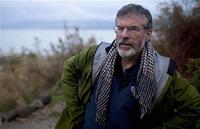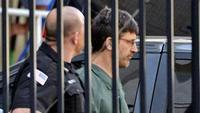-
Gerry Adams arrest: peace process in Northern Ireland can’t take much more pressure

The arrest last week of Sinn Féin leader Gerry Adams for questioning relating to the 1972 murder of Jean McConville threatens to undermine an established peace process in Northern Ireland, a process where the Rubicon has already been crossed, involving political sacrifice on all sides. Last December, following negotiations with all sides to the conflict, U.S. diplomat Richard Haass proposed a way to deal with outstanding issues in the peace process, a proposal which saw the past firmly on the agenda. The Adams arrest contradicts the Haass proposal, as it continues with the eclectic and incoherent approach to dealing with the open issues from a painful past. The Haass proposals may not be perfect, but experience from other countries shows that no perfect mechanism for dealing with the past exists. The key question now is not how to get to something better. It is a choice between Northern Ireland having a dedicated thought-through forum in which to contend with the past, or being forced to make do with political and legal institutions that were not designed to deal with it. The peace process has come too far, with both sides sacrifices to get this far. Its achievements should not be treated so carelessly.
-
-
U.S. should significantly reduce incarceration rate: study
There has been an unprecedented and internationally unique rise in U.S. state and federal prison populations, from 200,000 inmates in 1973 to 1.5 million in 2009. This increase occurred because of policy decisions such as mandatory sentencing, long sentences for violent and repeat offenses, and intensified criminalization of drug-related activity. Given the minimal impact of long prison sentences on crime prevention and the negative social consequences and burdensome financial costs of U.S. incarceration rates, which have more than quadrupled in the last four decades, the United States should revise current criminal justice policies to significantly reduce imprisonment rates, says a new report from the National Research Council. The dramatic rise in prison population “not serving the country well,” the report says.
-
-
More crude oil shipments by rail mean more accidents, but security measures lag

American rail companies have long operated under federal laws, making it difficult for local officials to gather information on cargo and how rail companies select their routes. An increase in the number of trains transporting crude oil, accompanied by a series of derailments and explosions, has highlighted the dangers of transporting hazardous substances by rail.In February, the Department of Transportation announced that railroads had voluntarily agreed to apply the same routing rules to oil trains that they currently apply to other hazardous materials. Critics say more needs to be done.
-
-
Vermont mandates labeling of foods containing GMOs
On Wednesday, legislators in Vermont passed a billrequiring the labeling of foods which contain genetically modified organisms (GMOs), making the state the first in the United States to pass such a law without contingencies. Proponents of the law, and of similar attempts across the country, hailed the legislative approval as a victory. About twenty other states have pending measures regarding labeling GMO-based foods, but the biotech and food industries have been lobbyingfederal legislators to prevent such measures.
-
-
Britons worry that new EU food inspection rules would risk U.K. food safety
The European Food Safety Authority(EFSA) in June will introduce a new Europe-wide food inspection regime, arguing that there is a need to modernize the food inspection process. The EFSA plans to reduce seventy pieces of detailed regulation down to a framework of five overarching laws to “reduce the burden on business.”Among other things, the new rules will replace laws that list diseases banned from the meat supply with a more general requirement on safety, health, and welfare. The EFSA claims that many of the diseases and parasites inspectors currently find are harmless to humans and are not considered major animal diseases. U.K. consumer advocates, meat inspectors, and veterinarians say the new rules threaten the safety of the U.K. food supply.
-
-
Federal judge: terrorism victims may seize Iranian-owned $500 million mid-Manhattan tower
Federal Judge Katherine Forrest on Friday ruled that the Iranian companies which own the 650 Fifth Avenue building in Manhattan must forfeit the property – evaluated between $500 and $700 million — to victims of terrorism who hold billions of dollars in judgments against Iran. The claimants include families who lost relatives in the 9/11 attacks and the 1983 Beirut bombing, in both of which Iran was implicated. The Iranian owners have vowed to appeal, but legal experts say the building assets could possibly be distributed while the challenge is pending.
-
-
More stringent climate policies mean hard choices for coal plant operators
Limiting climate change to 2°C means shutting down coal power plants — an unpopular proposition for coal power companies. A new study shows, however, that delaying climate policies could prove even worse for power plant owners. The reason: new power plants being built now, especially in China and India, are built to run for 30-50 years, paying off only after years of operation. Stringent climate policies, however, could make the cost of emission so high that coal power generation is no longer competitive, leaving new power plants sitting idle and their owners and investors with huge losses — a problem known as stranded capacity.
-
-
Critics: administration does not deport deportation-eligible undocumented immigrants
A recent report by the Center for Immigration Studies(CIS), a Washington, D.C. nonprofit calling for more restrictive immigration policies, says that in 2013, U.S. Immigration and Customs Enforcement (ICE) deported fewer than 195,000 illegal immigrants despite receiving more than 720,000 notices on immigrants who could be eligible for deportation. Moreover, 68,000 immigrants released from pending deportation cases had criminal convictions on their records, the report stated. Pro-immigration advocates say the figures are misleading. “CIS is essentially asserting that a legal-permanent resident or a recently naturalized citizen with a broken tail light should be charged by ICE and removed from the country although there is no basis in law for such action,” said Benjamin Johnson of the American Immigration Council.
-
-
Michigan terrorism case hinges on informant’s testimony
Mohammad Hassan Hamdan of Dearborn Heights, Michigan was arrested on Sunday, 16 March 2014, at Detroit Metro Airport by FBI agents who claim that Hamdan told an undercover informant of his plans to travel to Lebanon to join Hezbollah as a fighter supporting Syrian president Bashar al-Assad. Hamdan’s family and defense attorney note that the informantis a friend of Hamdan’s ex-girlfriend, and that he is receiving an immigration benefit for his services, two facts that should make the information he provides suspect.
-
-
Judge rebukes Sheriff Arpaio, his deputy for mocking, defying court orders
Grant Murray Snow, District Judge for the United States District Court for Arizona, earlier this week rebuked Sheriff Joe Arpaio of Maricopa County and chief deputy Jerry Sheridan for defying and mocking Snow’s order, issued last year, to stop targeting Latinos during routine patrols, traffics stops and work raids. “Whether or not the sheriff likes it, there is a distinction in immigration law that was not understood by the population and, with all due respect to you, it is not understood by the sheriff, which is that it is not a criminal violation to be in this country without authorization,” Judge Snow said pointedly.
-
-
Prosecutors ask for confidentiality in NY “Death Ray” case

Glendon Scott Crawford,a former General Electric Co. industrial mechanic, is standing trails in Albany, New York, for developed a radiological dispersal device which he tried to sell to both the KKK and to Jewish organizations so they could use it to kill Muslims. Several experts argued the device would not work since it would require massive amounts of electricity, weigh enough to crush most vehicles and would require victims to remain still in order to face prolonged exposure from close-range radiation.
-
-
Belfast court denies bail for former IRA commander accused of 1972 killing
Ivor Bell, 77, a former Irish Republican Army (IRA) commander accused of abducting and killing Jean McConville, 37, a mother of ten, in 1972, on Saturday was denied bail in a Belfast court. Prosecutors said the break in the case came as a result of information found in the recordings of Boston College’s oral history project which interviewed Northern Ireland paramilitary fighters involved in the long sectarian conflict there. The interviews were taped on the understanding that they would not be made public during the lifetimes of the subjects, but last year a U.S. court granted police in Northern Ireland access to the recordings.
-
-
Iranian court orders man's eyes to be gouged, and nose and one ear cut off
An Iranian court sentenced a main who poured acid on a young girl’s face to having his eyes gouged out and his right ear and nose cut off. The man was convicted last October of intentionally attacking the girl with acid, causing her to lose her eyesight and right ear.
-
-
NIST’s voluntary cybersecurity framework may be regarded as de facto mandatory
The National Institute of Standards and Technology’s (NIST) voluntary cybersecurity frameworkissued in February establishes best practices for companies that support critical infrastructure such as banking and energy. Experts now warn that recommendations included in the framework may be used by courts, regulators, and even consumers to hold institutions accountable for failures that could have been prevented if the cybersecurity framework had been fully implemented by the respective institution.
-
-
Google asks court to allow reposting of anti-Islamic film on YouTube

Google on Friday asked a U.S. appeals court to allow the reposting of an anti-Islamic movie on YouTube pending a re-hearing of the copyright case which led to the movie removal. Last Wednesday the Ninth Circuit Court of Appeals ordered Google to remove the movie from YouTube. Google told the court it has complied with the court’s earlier “unprecedented sweeping injunction,” but argued that irreparable harm is being done to Constitutional rights of YouTube, Google, and the public.
-
- All
- Regional
- Water
- Biometrics
- Borders/Immig
- Business
- Cybersecurity
- Detection
- Disasters
- Government
- Infrastructure
- International
- Public health
- Public Safety
- Communication interoperabillity
- Emergency services
- Emergency medical services
- Fire
- First response
- IEDs
- Law Enforcement
- Law Enforcement Technology
- Military technology
- Nonlethal weapons
- Nuclear weapons
- Personal protection equipment
- Police
- Notification /alert systems
- Situational awareness
- Weapons systems
- Sci-Tech
- Sector Reports
- Surveillance
- Transportation
Advertising & Marketing: advertise@newswirepubs.com
Editorial: editor@newswirepubs.com
General: info@newswirepubs.com
2010-2011 © News Wire Publications, LLC News Wire Publications, LLC
220 Old Country Road | Suite 200 | Mineola | New York | 11501
Permissions and Policies
Editorial: editor@newswirepubs.com
General: info@newswirepubs.com
2010-2011 © News Wire Publications, LLC News Wire Publications, LLC
220 Old Country Road | Suite 200 | Mineola | New York | 11501
Permissions and Policies
